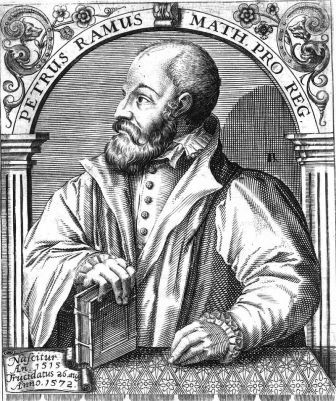More Search Results...

Early life:
He was born at the village of Cuts in Picardy; his father was a farmer. He gained admission at age twelve, to the Collège de Navarre, working as a servant. A reaction against scholasticism was in full tide, at a transitional time for Aristotelianism. On the occasion of taking his degree (1536) Ramus allegedly took as his thesis Quaecumque ab Aristotele dicta essent, commentitia esse, which Walter. Ong paraphrases as follows:
“All the things that Aristotle has said are inconsistent because they are poorly systematized and can be called to mind only by the use of arbitrary mnemonic devices.”
According to Ong this kind of spectacular thesis was in fact routine at the time. Even so, Ong raises questions as to whether Ramus actually ever delivered this thesis.
Early academic career:
Ramus, as graduate of the university, started courses of lectures. At this period he was engaged in numerous separate controversies. One opponent in 1543 was the Benedictine Joachim Périon. He was accused, by Jacques Charpentier, professor of medicine, of undermining the foundations of philosophy and religion. Arnaud d’Ossat, a pupil and friend of Ramus, defended him against Charpentier.[5] Ramus was made to debate Goveanus (Antonio de Gouveia), over two days. The matter was brought before the parlement of Paris, and finally before Francis I. By him it was referred to a commission of five, who found Ramus guilty of having “acted rashly, arrogantly and impudently,” and interdicted his lectures (1544).
The Way To Geometry
Series: Orange Line Academic Books
Genres: Academics, Mathematics & Geometry, Science & Nature & Philosophy Books
Plato saith “tov peov akei gewmetreiv”, That "God doth alwayes worke by Geometry", that is, as the wiseman doth interprete it, Sap. XI. 21. Omnia in mensura & numero & pondere disponere. Dispose all things by measure, and number, and weight: Or, as the learned Plutarch speaketh; He adorneth and layeth out all the parts of the world according to ra-te, proportion, and similitude.
More info →
































